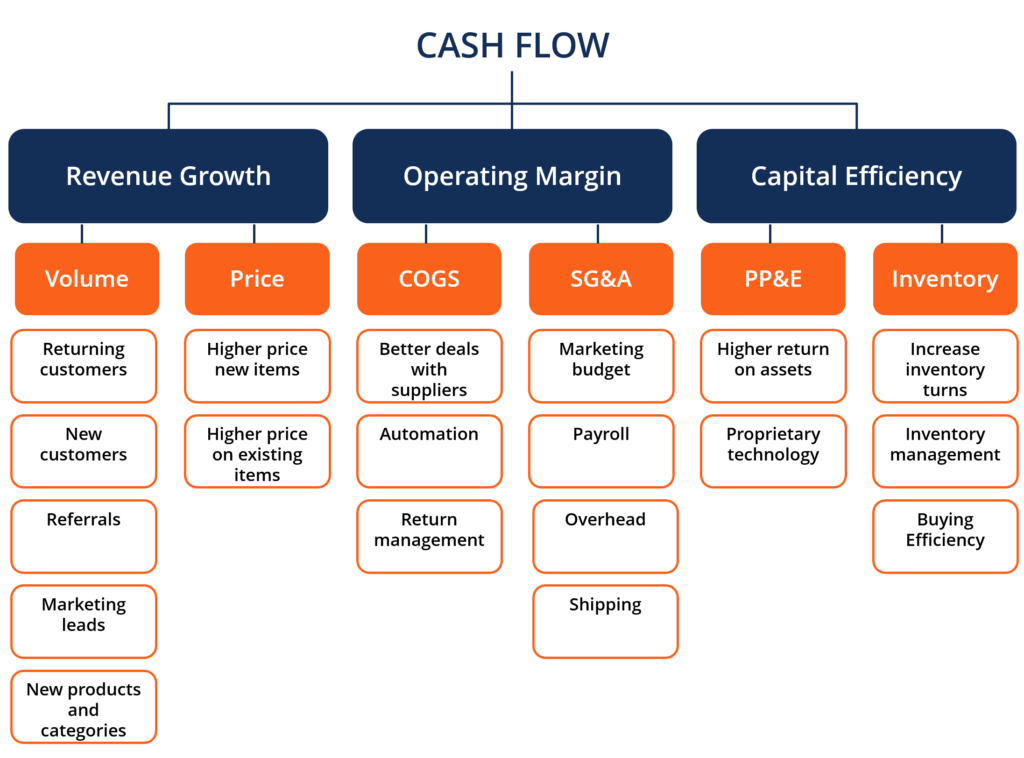Cash Flow
An increase or decease in money over a period of time
What is Cash Flow?
Cash Flow (CF) is the increase or decrease in the amount of money a business, institution, or individual has. In finance, the term is used to describe the amount of cash (currency) that is generated or consumed in a given time period. There are many types of CF, with various important uses for running a business and performing financial analysis. This guide will explore all of them in detail.

Types of Cash Flow
There are several types of Cash Flow, so it’s important to have a solid understanding of what each of them is. When someone refers to CF, they could mean any of the types listed below, so be sure to clarify which cash flow term is being used.
Types of cash flow include:
- Cash from Operating Activities – Cash that is generated by a company’s core business activities – does not include CF from investing. This is found on the company’s Statement of Cash Flows (the first section).
- Free Cash Flow to Equity (FCFE) – FCFE represents the cash that’s available after reinvestment back into the business (capital expenditures). Read more about FCFE.
- Free Cash Flow to the Firm (FCFF) – This is a measure that assumes a company has no leverage (debt). It is used in financial modeling and valuation. Read more about FCFF.
- Net Change in Cash – The change in the amount of cash flow from one accounting period to the next. This is found at the bottom of the Cash Flow Statement.
Uses of Cash Flow
Cash Flow has many uses in both operating a business and in performing financial analysis. In fact, it’s one of the most important metrics in all of finance and accounting.
The most common cash metrics and uses of CF are the following:
- Net Present Value – calculating the value of a business by building a DCF Model and calculating the net present value (NPV)
- Internal Rate of Return – determining the IRR an investor achieves for making an investment
- Liquidity – assessing how well a company can meet its short-term financial obligations
- Cash Flow Yield – measuring how much cash a business generates per share, relative to its share price, expressed as a percentage
- Cash Flow Per Share (CFPS) – cash from operating activities divided by the number of shares outstanding
- P/CF Ratio – the price of a stock divided by the CFPS (see above), sometimes used as an alternative to the Price-Earnings, or P/E, ratio
- Cash Conversion Ratio – the amount of time between when a business pays for its inventory (cost of goods sold) and receives payment from its customers is the cash conversion ratio
- Funding Gap – a measure of the shortfall a company has to overcome (how much more cash it needs)
- Dividend Payments – CF can be used to fund dividend payments to investors
- Capital Expenditures – CF can also be used to fund reinvestment and growth in the business
Cash Flow vs Income
Investors and business operators care deeply about CF because it’s the lifeblood of a company. You may be wondering, “How is CF different from what’s reported on a company’s income statement?” Income and profit are based on accrual accounting principles, which smooths-out expenditures and matches revenues to the timing of when products/services are delivered. Due to revenue recognition policies and the matching principle, a company’s net income, or net earnings, can actually be materially different from its Cash Flow.
Companies pay close attention to their CF and seek to manage it as carefully as possible. Professionals working in finance, accounting, and financial planning & analysis (FP&A) functions at a company spend significant time evaluating the flow of funds in the business and identifying potential problems.
Cash Flow Generation Strategies
Since CF matters so much, it’s only natural that managers of businesses do everything in their power to increase it. In the section below, let’s explore how operators of businesses can try to increase the flow of cash in a company. Below is an infographic that demonstrates how CF can be increased using different strategies.

Managers of business can increase CF using any of the levers listed above. The strategies for improving CF fall into one of three categories: revenue growth, operating margins, and capital efficiency. Each of those can then be broken down into higher volume, higher prices, lower cost of goods sold, lower SG&A, more efficient property plant & equipment (PP&E), and more efficient inventory management.
Additional Resources
Thank you for reading CFI’s guide to Cash Flow. To keep learning and developing your knowledge of financial analysis, we highly recommend the additional CFI resources below: